Quad-Cities’ River Bend Foodbank Seeing Record Demand Since Pandemic
The Covid-19 pandemic has not only devastated the U.S. economy and cost more than 260,000 American lives, it is driving record hunger in the greater Quad-Cities region.
“The number of people who don’t have enough food to eat in the QCA has increased by over 50 percent since Covid,” Mike Miller, president/CEO of River Bend Foodbank, said this week. “There are now almost 150,000 in the 23 counties we serve, 1 in 7 people and 1 in 4 children who are food insecure.”
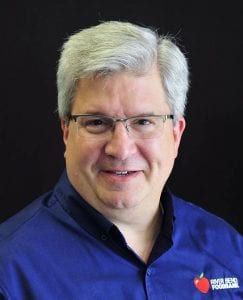
Mike Miller is president/CEO of the River Bend Foodbank, Davenport.
“The Foodbank has responded with record-setting food distributions in April, May, June, and July, with over 2 million meals distributed every month since then,” said Miller. “For comparison, the Foodbank’s first 1 million meal month in its 38-year history was in April of 2016, and we are now distributing 2 million meals each month just four years later.”
From its 60,000-square-foot warehouse in Davenport, the foodbank supplies 300 food pantries across 23 counties in eastern Iowa and western Illinois. One meal is defined as 1.2 pounds of food, and this April, River Bend set its first distribution record, with 1.825 million meals – rising each month with October hitting 2.2 million, Miller said Wednesday.
“Covid has put us at the highest level ever,” he said, defining food insecurity as “insufficient access to food needed to lead a healthy and active lifestyle. It’s not a little bit hungry,” Miller said. “It’s people who have limited access to food that inhibits their ability to learn, to work, to be active enough to be healthy.”
The national nonprofit group Feeding America says that 80 percent of food banks are serving more people than they were at the same time last year. “And in many cases, our neighbors visiting food banks are visiting for the first time,” according to feedingamerica.org.
Feeding America estimates that because of the pandemic, 50 million people could be at risk of hunger in 2020. “So many people who’ve never wondered whether they could afford a holiday meal are realizing that this year will be different,” the organization says. “On top of the stress the pandemic has caused, many of our neighbors are also facing hunger.”
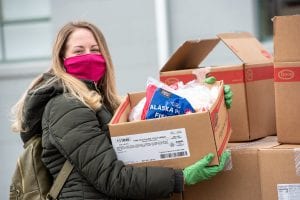
Feeding America estimates more than 4 billion meals have been distributed by food banks since the start of the pandemic in the U.S.
From the beginning of March through the end of October, food banks have distributed an estimated 4.2 billion meals in the U.S. In October alone, food banks distributed about 50 percent more food than an average month, Feeding America said.
Before Covid, River Bend Foodbank would get about 70 percent of its supply from manufacturers, grocery stores, restaurants and other donations; 20 percent from a federally-funded food assistance program, and the rest it purchased directly, Miller said.
After Covid hit, most supermarket shelves emptied quickly and they couldn’t donate food; government support increased to 30 percent and River Bend had to increase the portion it bought directly by 50 percent, he said.
“And the whole pie is up — it’s a bigger slice of a bigger pie, and costs have skyrocketed,” Miller said, noting there have been serious interruptions in the food-supply chain, as demand has exploded.
Two other obstacles have also risen recently, he explained. First is, with the trade war with China, tariffs were put on food imports and the
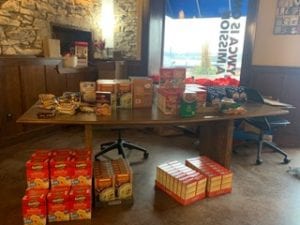
Volunteers assembled Thanksgiving meal boxes at the YWCA empowerment center in Davenport Wednesday.
amount of food that used to get exported wasn’t sold, Miller said.
And the pre-packaged food boxes that food banks could get from the U.S. Department of Agriculture at no charge will end Dec. 31, he said.
Unemployment benefits will terminate for more than half of current recipients (about 12 million people) at the end of December, coinciding with a lapse in federal protections for renters and a resumption in student loan payments, according to cnbc.com.
That intersection may spell financial catastrophe for jobless workers without action from Congress or the White House, according to economists.
More than 827,000 people filed first-time applications for state unemployment benefits last week, the Labor Department said Wednesday. That was up 78,000 from a week earlier, before adjusting for seasonal patterns, and more than 100,000 from the first week of November, when weekly filings hit their lowest level since pandemic-induced layoffs began last spring.

Deanna Woodall is vice president of development for YWCA Quad Cities.
“Probably the most heartbreaking thing I’ve seen during this crisis is the number of people who need help that never needed help before in their lives,” Miller said. “They don’t know what to do; they should come get help. They think that’s for somebody else — it’s not. If food would help you, come see us. Go to riverbendfoodbank.org, and it shows a map, with all the places where there are food pantries, and when they’re open.”
Costs have risen because the foodbank is buying so much more food and there’s such a huge increase in demand, he said.
“We’re trying to be careful. We’re very frugal with any money,” Miller said of donations. “We’re so frugal, people entrusting us with their gift. We’re careful to get the best deals and make good choices. We did a good job ordering it three months agio, and ordering food we’re going to receive in January or February, we’re continually having to work to stay ahead of the game.”
“By far and away, this is a community supported organization, with grants, corporate gifts, individual donations,” he said. “It’s important this time of year that support continues.”
The Q-C area was very generous financially this past spring, soon after Covid hit, but Miller worries those donations may replace what people and organizations would normally give in December.
Student Hunger Drive postponed to Fall 2021
River Bend also is missing a major food donation – the annual Student Hunger Drive, which had to be canceled in area schools this fall. It’s been going 35 years.
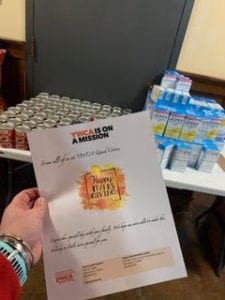
A note of encouragement was put in each YWCA Thanksgiving meal kit.
“That’s such a great legacy for the community, one of the things that’s unique to the Quad-City area,” Miller said. “We’ve got an entire generation of Quad Citizens who have awareness of the hunger issue because they went through the Student Hunger Drive in high school. We hated missing it. Some schools are still trying to collect things, people still help us directly.”
“We can’t have kids knocking on doors asking for food; it wouldn’t be safe,” he said. Though they planned to reschedule it for spring 2021, the annual hunger drive will not return until next fall, Miller said.
During the 2019 Student Hunger Drive, students from 17 area high schools provided 568,317 meals to help feed the hungry in eastern Iowa and western Illinois.
It’s hard to make up that loss, Miller said. “On one hand, we’ve made up for it, since we’ve secured so much more, but so much more food has gone out the door,” he said.
To meet the need for Thanksgiving, the YWCA of the Quad Cities on Wednesday distributed 88 Thanksgiving Meal Kits to local families, with the largest family consisting of 11 members, said Deanna Woodall, YWCA vice president of development and growth. A similar food drive last year helped about 10 families.
“We’re just glad to be able to do it,” Woodall said this week, noting she raised $1,000 in monetary donations, matched by a YWCA grant. She offered the food boxes on Facebook and “it spread like wildfire,” she said. “Everyone was sharing it.”
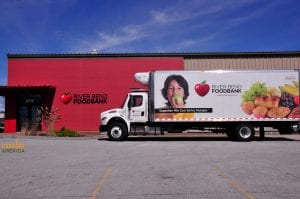
River Bend Foodbank is at 4010 Kimmel Drive in southwest Davenport.
“There’s a need and these people are so grateful,” Woodall said. “Covid has done this to a lot of people. Food insufficiency is a direct result of Covid – the loss of jobs, the loss of income. People debate, what am I going to pay for this month? We’re helping them get back on track. It’s another way of empowerment for our community.”
Each box given out Wednesday at the YWCA Iowa Empowerment Center (at One River Place, Davenport) was brought to families there by volunteers for contactless pickup. The kits included a ham or turkey, mashed potatoes, sweet potatoes, green beans, cornbread mix, mac & cheese, gravy and stuffing mix, Woodall said.
“As most of you know, I absolutely love what I do. Empowering women and families in the Quad-Cities fills me with joy,” she posted recently on Facebook about the food drive. “That said, this is something that I would never be able to without the support of my family, my friends and the wonderful, very generous organizations that support our mission at YWCA Quad Cities.
 “As we get closer to celebrating Thanksgiving Day, I just want to say I am so thankful to be able to do what I do and more importantly, I am thankful for each and every one of you,” she wrote. “Our work doesn’t stop by providing these Thanksgiving Meal Kits; we do this work every. single. day. so any and all donations are always welcome and greatly appreciated…”
“As we get closer to celebrating Thanksgiving Day, I just want to say I am so thankful to be able to do what I do and more importantly, I am thankful for each and every one of you,” she wrote. “Our work doesn’t stop by providing these Thanksgiving Meal Kits; we do this work every. single. day. so any and all donations are always welcome and greatly appreciated…”
SouthPark Mall in Moline is holding a drive-thru Thanksgiving Community Dinner on Thursday, social distancing style, from 4 p.m. to 6 p.m., as the annual Mr. Thanksgiving free meal, instead of an indoor sit-down dinner.
Volunteers will be on-site to help direct traffic – on the east side of the mall, off 27th Street, and Hy-Vee will be preparing the food and handing out to-go containers.
In the downloadable flyer on the mall website, you will find directions on traffic flow. The yellow highlights no parking, the red blocks say where vehicles line up in single rows. Green arrow symbolizes one lane of flow of traffic to pick up the meal. The purple line signifies where the food is actually delivered.
For more information on River Bend, visit www.riverbendfoodbank.org. For more on the local YWCA, visit https://ywcaqc.org.









